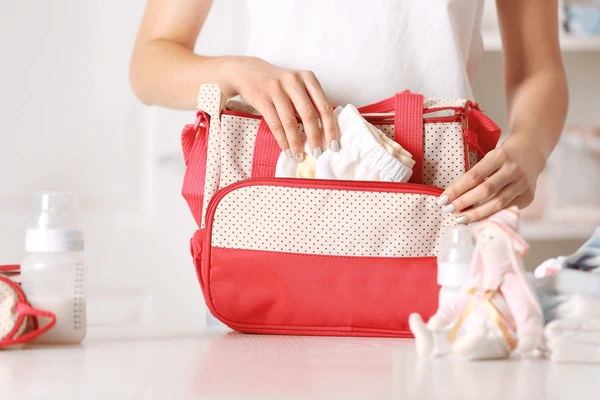Introduction: Why Every Parent Needs a Newborn First Aid Kit
Bringing a baby home is one of life’s most beautiful moments but let’s be honest, it can be overwhelming too. Between the feedings, diaper changes, and sleepless nights, the last thing you want is to scramble for a thermometer or antiseptic when your little one gets a fever or a tiny scratch.
That’s where a newborn first aid kit comes in. It’s your safety net. Having a well-stocked kit means you’ll always be prepared for those inevitable little mishaps that come with parenthood.
In this post, we’ll walk you through a complete newborn first aid kit essentials checklist, what each item is for, how to use it safely, and some expert tips to keep your baby healthy.
What Should Be in a Newborn First Aid Kit?
Here’s a complete, mom-approved checklist of everything you need in your baby’s first aid kit:
1. Digital Thermometer
Why You Need It: Babies can’t tell you they have a fever. A digital thermometer provides an accurate reading quickly.
Pro Tip: Opt for a rectal thermometer for newborns (it’s the most accurate for this age).
2. Nasal Aspirator (Bulb Syringe or Electric)
Why You Need It: Newborns often struggle with nasal congestion, especially during colds or allergy seasons.
Pro Tip: Pair it with a saline spray for better results.
3. Saline Nasal Drops/Spray
Why You Need It: Helps loosen mucus and relieve nasal stuffiness naturally.
Pro Tip: Use a drop or two in each nostril before using the aspirator.
4. Baby Nail Clippers or Emery Board
Why You Need It: Newborn nails grow quickly and can scratch their delicate skin.
Pro Tip: Clip nails while baby is asleep or after a bath when nails are softer.
5. Baby-Safe Pain Reliever (Acetaminophen/Paracetamol)
Why You Need It: For fevers, teething discomfort, or post-vaccination soreness.
Note: Always check with your pediatrician before use and confirm correct dosages for newborns.
6. Alcohol-Free Antiseptic Wipes
Why You Need It: For cleaning minor cuts, scrapes, or skin irritations safely.
7. Baby Band-Aids and Sterile Gauze Pads
Why You Need It: For protecting tiny wounds or covering small scrapes.
Pro Tip: Look for hypoallergenic, gentle adhesive options for sensitive baby skin.
8. Digital Baby Scale (Optional but Helpful)
Why You Need It: To track your baby’s weight gain and growth milestones at home.
9. Baby-Safe Sunscreen (For 6 Months+)
Why You Need It: If you’ll be outdoors with your baby after six months, use a mineral-based, baby-friendly sunscreen.
10. Teething Gel or Rings
Why You Need It: Soothes sore gums during the teething phase.
Pro Tip: Chill teething rings in the fridge for added relief.
11. Baby Gas Relief Drops
Why You Need It: Newborns often struggle with colic and gas.
12. Diaper Rash Cream
Why You Need It: Prevents and treats diaper rashes caused by moisture and irritation.
13. Sterile Cotton Balls and Swabs
Why You Need It: For cleaning delicate areas like around the umbilical stump or outer ear.
14. Baby-Friendly Insect Repellent (For 2+ Months)
Why You Need It: Protects against mosquito bites in baby-safe formulas.
Bonus Essentials You’ll Be Glad You Have
- Baby Toothbrush & Gum Cleaner
- Digital Humidifier (for dry air and congestion relief)
- Hand Sanitizer (for you before handling the baby)
- Oral Syringe or Dropper for Medicines
- Thermometer Probe Covers
- Emergency Contact Card (pediatrician, poison control, hospital)
Where to Store Your Newborn First Aid Kit
Keep your first aid kit:
- In an easy-to-access drawer or shelf in the nursery.
- Out of reach of older siblings.
- Portable if possible having a small version for the diaper bag is super helpful.
Pro Tip: Check your kit monthly and replace expired medications or used supplies.
DIY Newborn First Aid Kit: How to Assemble Yours
Here’s a quick guide to assembling your own kit affordably:
You’ll need:
- A small storage box or pouch
- Labelled ziplock bags to separate categories (medications, grooming, wound care)
- Checklist inside the box for quick reference
Baby First Aid Skills Every Parent Should Know
Having the tools is only part of it here are a few skills worth learning:
- How to take a rectal temperature
- How to clear a blocked nose
- Basic infant CPR
- How to treat a minor cut
- Recognizing signs of fever, dehydration, and colic
Consider taking an infant first aid course online or with your healthcare provider.
Final Thoughts: Stay Ready, Stay Calm
Parenting a newborn can feel overwhelming, but a little preparation goes a long way. A well-stocked newborn first aid kit ensures you can handle those minor emergencies quickly and confidently.
Save this checklist, share it with other moms, and pin it for later because peace of mind is one of the best gifts you can give yourself.
